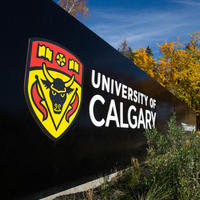Doctor of Philosophy
Doctor of Philosophy (PhD), a thesis-based, on-campus degree
A research-intensive (thesis-based) degree, our Doctor of Philosophy (PhD) is intended to prepare scholars for careers in research and teaching. This program is full-time, and is delivered on campus. Students work with a supervisor (assigned upon admission) to complete doctoral coursework, research, writing, and defense of doctoral candidacy and the dissertation.
Graduate Programs in Education offers the PhD program in several specializations.
Program Details
Please visit the candidacy and dissertation section of our website for information.
Doctoral Procedures Checklist
At the beginning of program:
- Register for an eID to access myUCalgary. Keep your eID and password confidential.
- Accept your Offer of Admission in the online Student Centre.
- Activate your UCalgary IT account and e-mail. You will be expected to regularly check your UCalgary e-mail while in program.
- Confirm your current e-mail address to your Graduate Program Administrator (see your Admission Letter for contact information). Please include your full name, UCID number, program, and specialization.
- Connect with your supervisor to plan your program.
- Initialize your registration.
- Register for courses.
- Check with the Faculty of Graduate Studies, Research Services, and SSHRC for possible research funding.
- Attend orientation at the beginning of September!
Within 12 months:
- Confirm the number of courses required for program completion with the supervisor.
Every May:
- Submit your online Annual Progress Report form through your online Student Centre. Your progress report must be approved by your supervisor, and Graduate Program Director or designate.
Every 12 Months:
- Complete registration initialization.
Within 15 months:
- Consult with supervisor regarding the appointment of the supervisory committee. Complete the Appointment of Supervisory Committee form.
Within 28 months:
- Request candidacy examination guidelines.
- Complete all course work prior to the candidacy examination.
- Submit a research proposal to the supervisory committee. If acceptable, this proposal is signed by the members of the supervisory committee and placed in the student's file.
- Complete candidacy requirements and examination.
Within 4 to 6 years:
- Have ethics application approved before collection of data.
- Complete thesis and final oral examination.
- Submit two unbound copies of the thesis to the Faculty of Graduate Studies along with the Thesis Clearance form.
- Submit an Application for Degree through your Student Centre.
- Attend convocation and celebrate!
-
Funding
The Werklund School of Education provides funding opportunities for full-time doctoral students admitted to the on-campus program, for the first 4 years in program.
-
Awards and Scholarships
Current students are required to apply for internal and external scholarships (e.g., Tri-Council awards including SSHRC, CIHR), for which they are eligible to be considered for program funding for the following academic year.
As a Graduate Student you are expected to devote the time, effort, and energy necessary to engage in scholarship. As a graduate student, you will determine the specific milestones and requirements of your program of study in consultation with the Faculty of Graduate Studies Calendar and with your graduate supervisor.
An integral part of the masters experience is working closely with a supervisor on the development and completion of a research project. A graduate supervisor mentors graduate students through regular meetings and research training aimed at research, scholarship, teaching and professional development. Graduate supervisors support students in the timely completion of their programs. As a Graduate Student, you are expected to meet with your graduate supervisor on a regular basis. While each student-supervisor relationship is unique, graduate supervisors can assist graduate students in a number of ways: advising on course selection, applying for awards and scholarships, obtaining research funds, applying for teaching assistant and sessional teaching opportunities, developing track records in refereed publications and conference presentations, getting involved in leadership and service, and encouraging and supporting apprenticeship in a research community of practice (collaborative review of papers, grants, academic writing, and data analysis).
A supervisor is normally appointed at the time of admission.
Adult Learning
Adult learning and education is informed by a rich heritage rooted in a commitment to human, community, and social development. Studies in adult learning draw from multiple and diverse contexts and interest areas that include post-secondary and continuing education, business and industry, NGOs, community development, and international organizations.
Curriculum & Learning
Curriculum and learning studies compass issues of content, context, and teaching in both formal and non-formal educational settings. Students may explore contemporary themes including issues of globalization, gender, culture, power, traditions of wisdom, ecology in education, and the ideas and practices of social justice. Themes are examined from social, cultural, historical, political, discursive, ecological, and other interpretive perspectives.
Language & Literacy
Language and literacy studies prepare students to understand and conduct research on various dimensions of literacy, linguistic and cultural diversity. Our studies encompass the acquisition, use, teaching, and learning of languages, multiliteracies (multiple meaning-making systems, including print, visual, oral, audiovisual, and gestural texts), and new literacies and digital media.
Leadership
Studies in leadership and educational policy draw upon the social sciences and humanities to prepare our researchers and practitioners for administrative and research-related careers. Students analyze and resolve contemporary issues related to educational policy, organizational change, and the direction and management of schools, school systems, other institutions, and governmental bodies concerned with public and private education.
Learning Sciences
Learning science is an interdisciplinary field of scholarship that works to further scientific, humanistic, and critical theoretical understandings of learning. Our students engage in the design and implementation of pedagogical innovations to support learning. Our primary mission is the advancement of knowledge, and the preparation of future researchers and scholars of the discipline in the learning sciences.
Spring 2024
Start of Classes: Monday, May 6, 2024
End of Classes: Monday, June 17, 2024
Please note that specialization courses are only offered in the Summer term.
- EDER 616 Design-Based Research Methods in Education L01 (31198)
You may fulfill some of your program requirements by taking courses from other departments/faculties. You should seek permission to register from your supervisor and the respective unit/faculty.
Below is a list of Spring 2024 courses from other departments/units that you may consider taking. This list is not all encompassing, nor are we mandating that you take one or any of these courses. It is, as a student, your responsibility to initiate permission with your supervisor and the respective unit/faculty to take one of these courses.
- NURS 623/723: Hermeneutic Research
Summer Residency 2024
Start of Classes: Monday, June 24, 2024
End of Classes: Tuesday, August 6, 2024
Summer classes run from Monday, June 24 - Tuesday, August 6, 2024.
On campus summer residency dates are Monday, July 08 - Friday, July 19, 2024.
For all specialization courses please contact your supervisor for recommendations.
Please note that specialization courses are only offered in the Summer term.
Fall 2024
Start of Classes: Tuesday, September 3, 2024
End of Classes: Friday, December 6, 2024
Please note that specialization courses are only offered in the Summer term.
- EDER 701.25 Mixed Methods L01 (76005)
- EDER 720 Interpretive Inquiry L01 (75500)
Winter 2025
Start of Classes: Monday, January 13, 2025
End of Classes: Friday, April 11, 2025
Please note that specialization courses are only offered in the Summer term.
- EDER 701.19 Narrative Inquiry L01 (13356)
- EDER 701.20 Indigenous Methodologies in Education L02 (15431)



